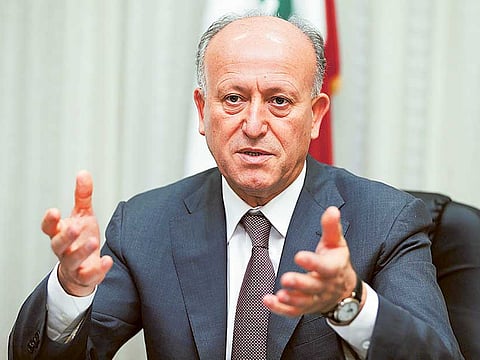Rifi vows to provide Tripoli with 24/7 electricity
Despite paying Electricite du Liban $2b a year it only meets half of the country’s power needs

Beirut: Lebanese Justice Minister Ashraf Rifi pledged on Sunday to provide his hometown of Tripoli with round-the-clock electricity, as the country grapples with daily power cuts due to corruption and political manoeuvring.
Rifi, who swept the municipal elections in the city back in May 2016, is determined to transform his shocking victory into concrete achievements.
He already shot to stardom after he submitted his resignation earlier this year over the judiciary’s failure to prosecute Lebanese politician Michel Samaha for plotting attacks in the country at the behest of Syria.
Observers say Rifi is looking to replace Sa’ad Hariri as the leader of Lebanese Sunnis and he has not minced his words when criticising the son of the widely-respected Rafik Hariri, who was assassinated in 2005 in car bomb, believed to be linked to Hezbollah and Syria.
It is unclear how Rifi proposes to move forward with his promise but he said he has already contacted former prime minister Najeeb Mikati to help him on the matter.
Ideally, he would need the backing of other former ministers like Mohammad Safadi, Faisal Karami and even Sa’ad Hariri.
The Lebanese government spends nearly $2 billion (Dh7.34 billion) a year through the national utility Electricite du Liban (EDL) which barely produces 1600 megawatts each day falling critically short of the population’s needs which stand around 3,500 megawatts.
As a result, most households purchase power from private sources that have sprung throughout the country, which means that most households spent on average $1,300 on electricity — two thirds of which on neighbourhood generators — in a country where the gross national income per capita is $11,000, according to the latest World Bank estimates.
Consequently, Beirut endures a daily three-hour power outage, although in some areas of the country, including Tripoli, electricity is available for only a few hours.
Most street lamps are off at night, including on the airport road, an embarrassment for visiting tourists.
The government allocates a whopping 15 per cent of all budgetary expenditures to EDL — compared with 7 per cent for education and 9 per cent on health — and could easily overhaul the system to ensure 24-hour power that experts confirmed would cost no more than $5-6 billion, through a solid partnership with the private sector.
For now, most of Lebanon, including Tripoli, suffers under an ageing infrastructure and the rise of private generator companies, most of which are owned by leading politicians, in what are widely unregulated transactions.
The sole exception to this monopoly is the city of Zahle in the Bekaa Valley, which enjoys 24 hours of uninterrupted power because of a fluke legal permit that allowed Electricite de Zahle (EDZ) to operate outside EDL’s clutches.
Rifi said he does not want to emulate EDZ or SEJ but will submit a request to the Energy Ministry to revive the Qadisha Company. The privately-held Qadisha Electricity Company (QEC) was established in 1964, though EDL liquidated it when it affirmed its monopoly, as Rifi vowed to “use the public grid by force, because this grid is the property of Tripoli’s people”, he thundered.
Under Rifi’s new plan, consumers would continue to pay two separate bills, one to EDL and one to QEC, though the latter will apparently be 30 per cent cheaper than current obligations. He added that QEC will cease to exist once EDL starts to provide round-the-clock power itself, which experts anticipate will occur in 2038.
In 2015, the municipality of Jbayl [Byblos] established the Société Electricité de Jbeil SAL (SEJ), applied for a license to build a modern power plant, and pledged to provide electricity to 40,000 inhabitants. It is still waiting for a response as EDL is loathe to surrender its monopoly, even if SEJ will initially produce a mere 60 megawatts per day.
Sign up for the Daily Briefing
Get the latest news and updates straight to your inbox



